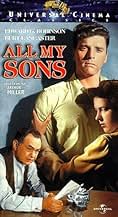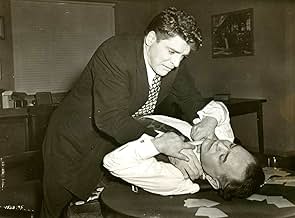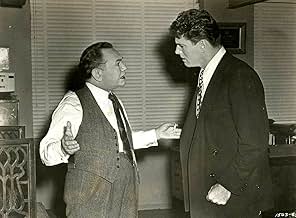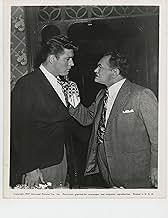IMDb RATING
7.3/10
2.6K
YOUR RATING
During WW2, industrialist Joe Keller commits a crime and frames his business partner Herbert Deever but years later his sin comes back to haunt him when Joe's son plans to marry Deever's dau... Read allDuring WW2, industrialist Joe Keller commits a crime and frames his business partner Herbert Deever but years later his sin comes back to haunt him when Joe's son plans to marry Deever's daughter.During WW2, industrialist Joe Keller commits a crime and frames his business partner Herbert Deever but years later his sin comes back to haunt him when Joe's son plans to marry Deever's daughter.
- Director
- Writers
- Stars
- Awards
- 2 wins & 2 nominations total
Harry Morgan
- Frank Lubey
- (as Henry Morgan)
Margaret Bert
- Townswoman
- (uncredited)
Walter Bonn
- Jorgenson
- (uncredited)
Helen Brown
- Mrs. Hamilton
- (uncredited)
Pat Flaherty
- Bartender
- (uncredited)
Jack Gargan
- Workman
- (uncredited)
Harry Harvey
- Judge
- (uncredited)
Jerry Hausner
- Halliday
- (uncredited)
Herbert Heywood
- McGraw
- (uncredited)
- Director
- Writers
- All cast & crew
- Production, box office & more at IMDbPro
Featured reviews
Playwright Arthur Miller had a great deal at stake when his play 'All my Sons' opened on Broadway in 1947. He later admitted that had the play failed he would have been obliged to find another line of work. Directed by Elia Kazan and featuring a top notch cast it ran for almost two years. The rest, as they say, is history.
It did not take long of course for Hollywood to pounce and to make a version that Miller himself came to despise. This play is not the last in which Miller would show the darker side of the American Dream. Adaptor Chester Erskine has however, carefully removed any of Miller's leftist sentiments and the crime committed by Joe Keller in selling defective cylinders to the US Airforce, which results in the death of 21 pilots, is blamed on Keller's own greed rather than the Capitalist system that created him and so many like him.
To my knowledge there is nothing in the previous films of Irving Reis that would suggest his being capable of doing justice to this material and his direction lacks fluidity. He is aided by the 'noirish' touches of cinematographer Russell Metty and an understated score by Leith Stevens. In keeping with the inevitable compromise of film, some characters, notably Dr. and Mrs. Bayliss, have been diminished. Keller's business partner Deever who has taken the rap for the crime and is only spoken of in the play, is here given a speaking role which is filmically very effective. Deever's daughter Ann is played by Louisa Horton who is not a typical Hollywood glamour puss by any means but whose directness and sincerity make her excellent casting. This was to be her first and only film role of note. Burt Lancaster plays Keller's son Chris. Although keen to improve as an actor, Lancaster's charisma works against him here and he does not really convince as an average Joe. As Deever's son, Howard Gruff is as Duff as ever and strictly one dimensional. The strength of the film lies in the performances of Edward G. Robinson and Mady Christians as Joe and Kate. Robinson is superlative as a man whose outward bonhomie and confidence conceal a terrible sense of guilt. His assertions that he did it 'for the family' have a hollow ring. Kate is living in a fantasy world, clinging to the belief that their son Larry, reported lost in action, will return. The devastating scene in which she reads the letter confirming his death is beautifully played.
Ironically Miller, Robinson and Christians were all summoned by the HUAC for alleged Communist leanings. Miller emerged unscathed, Robinson's 'A' listing suffered throughout the 1950's until Cecil B. de Mille came to his rescue but Christians was not so fortunate. Her outspokenness not only shattered her career but ended her life.
This piece is decidedly not filmed theatre. It is cinema but alas, not great cinema.
It did not take long of course for Hollywood to pounce and to make a version that Miller himself came to despise. This play is not the last in which Miller would show the darker side of the American Dream. Adaptor Chester Erskine has however, carefully removed any of Miller's leftist sentiments and the crime committed by Joe Keller in selling defective cylinders to the US Airforce, which results in the death of 21 pilots, is blamed on Keller's own greed rather than the Capitalist system that created him and so many like him.
To my knowledge there is nothing in the previous films of Irving Reis that would suggest his being capable of doing justice to this material and his direction lacks fluidity. He is aided by the 'noirish' touches of cinematographer Russell Metty and an understated score by Leith Stevens. In keeping with the inevitable compromise of film, some characters, notably Dr. and Mrs. Bayliss, have been diminished. Keller's business partner Deever who has taken the rap for the crime and is only spoken of in the play, is here given a speaking role which is filmically very effective. Deever's daughter Ann is played by Louisa Horton who is not a typical Hollywood glamour puss by any means but whose directness and sincerity make her excellent casting. This was to be her first and only film role of note. Burt Lancaster plays Keller's son Chris. Although keen to improve as an actor, Lancaster's charisma works against him here and he does not really convince as an average Joe. As Deever's son, Howard Gruff is as Duff as ever and strictly one dimensional. The strength of the film lies in the performances of Edward G. Robinson and Mady Christians as Joe and Kate. Robinson is superlative as a man whose outward bonhomie and confidence conceal a terrible sense of guilt. His assertions that he did it 'for the family' have a hollow ring. Kate is living in a fantasy world, clinging to the belief that their son Larry, reported lost in action, will return. The devastating scene in which she reads the letter confirming his death is beautifully played.
Ironically Miller, Robinson and Christians were all summoned by the HUAC for alleged Communist leanings. Miller emerged unscathed, Robinson's 'A' listing suffered throughout the 1950's until Cecil B. de Mille came to his rescue but Christians was not so fortunate. Her outspokenness not only shattered her career but ended her life.
This piece is decidedly not filmed theatre. It is cinema but alas, not great cinema.
ALL MY SONS may have been slightly diluted for the screen as compared to the stage play which implicated corruption and wartime profiteering on a higher level than just one or two business men, but it's still powerful stuff and extremely well directed by Irving Reis. Individual scenes have a strength that is impressive, largely due to the excellent central performances of BURT LANCASTER, EDWARD G. ROBINSON and MADY CHRISTIANS. Robinson, in particular, makes the most of a meaty role that has him cocky and confident one moment, then bruised and bitter the next as his past crimes catch up with him--and his conscience.
Seems that during WWII, he and his partner (FRANK CONROY) were pressured to finish making cylinder parts for airplanes on the government's tight schedule and knowingly sent defective parts which caused the death of twenty-one pilots when their planes went down. Robinson has been hiding the truth from himself and his neighbors ever since, concerned only with making a decent living for himself and his family in suburban America.
Conflicts arise when others around him begin to question his role in the crime that sent his partner to jail. The son of the jailed partner, played in rather stiff fashion by HOWARD DUFF, is unforgiving when he realizes Robinson shared the guilt with his father and yet let his father take the blame for the incident. Lancaster, too, and his girlfriend (LOUISA HORTON) who happens to be Duff's sister, also bring the conflicts into the open when they start asking for answers and probing for the truth. Horton is rather colorless in what is meant to be a sympathetic role and spent her remaining years in TV roles.
But it's EDWARD G. ROBINSON who makes the biggest impression as the father, proud of his achievements and obviously in denial until his son, Lancaster, makes him realize why his other son never returned from the war--which leads to a tragic ending.
Summing up: Somber drama never quite overcomes its stage origins but it's still powerful stuff.
Trivia note: The only implausible factor in the casting--the physical impossibility of BURT LANCASTER as Robinson's son, when he bears no physical resemblance whatsoever to Eddie--nor Mady Christians for that matter!
Seems that during WWII, he and his partner (FRANK CONROY) were pressured to finish making cylinder parts for airplanes on the government's tight schedule and knowingly sent defective parts which caused the death of twenty-one pilots when their planes went down. Robinson has been hiding the truth from himself and his neighbors ever since, concerned only with making a decent living for himself and his family in suburban America.
Conflicts arise when others around him begin to question his role in the crime that sent his partner to jail. The son of the jailed partner, played in rather stiff fashion by HOWARD DUFF, is unforgiving when he realizes Robinson shared the guilt with his father and yet let his father take the blame for the incident. Lancaster, too, and his girlfriend (LOUISA HORTON) who happens to be Duff's sister, also bring the conflicts into the open when they start asking for answers and probing for the truth. Horton is rather colorless in what is meant to be a sympathetic role and spent her remaining years in TV roles.
But it's EDWARD G. ROBINSON who makes the biggest impression as the father, proud of his achievements and obviously in denial until his son, Lancaster, makes him realize why his other son never returned from the war--which leads to a tragic ending.
Summing up: Somber drama never quite overcomes its stage origins but it's still powerful stuff.
Trivia note: The only implausible factor in the casting--the physical impossibility of BURT LANCASTER as Robinson's son, when he bears no physical resemblance whatsoever to Eddie--nor Mady Christians for that matter!
The movie version of Arthur Miller's All My Sons is yet another excellent example of how a fairly dreadful play can make a watchable, even beautiful film. In its day quite relevant, the play now reeks of the stuffily leftish Old Testament pieties of the Group Theatre of the thirties, and in style, if not content, anticipates the think-piece, more mainstream television dramas of the fifties. The plot is worth going into only briefly, and concerns a morally corrupt though not innately bad manufacturer of aircraft parts whose cost-cutting was responsible for the crashing of several planes during the then recent Second World War. Set in what appears to be either a New York suburb or a leafy section of one of the city's outer boroughs, the films is beautifully photographed and designed. It isn't quite realistic, as it is obviously a studio product, but it is far less artificial-looking than most movies of the period, and is singularly evocative in every detail of a way of middle class life, leisurely and informal, egalitarian and yet conscious of social distinctions, that has long passed into history. Beautifully rendered also is the large, very comfortable house in and around which much of the film takes place. Not quite a mansion, it is nevertheless roomy and in its way elegant, of Victorian vintage or nearly so. We get to see so much of it. The dining room, with its fluffy, lacey things all about; the heavy soup bowls and plates decorated with vines and flowers; and in its somwhat retro feeling it appears, like the family itself, both vaguely European and wholesomely American. Everything in the house seems heavy and solid, nailed down, as it were, as if this way of life was going to go on forever. The scenes in the backyard show the lazy, hazy summer afternoons of lemonade and hammocks, before the arrival of television, interstate highways, and shopping malls. Overall the picture is so brilliantly and minutely detailed, whether the set is a restaurant or a factory, that it is astonishing that it didn't win the Academy Award for set design. The action, consisting mostly of people either arguing with one another, lying, or expressing strong emotions, like love and hate, is very well presented and framed within the various settings. None of the actors in the film, including a young Burt Lancaster, is at his absolute best, though Edward G. Robinson, as the paterfamilas, in snugly in his element here, and quite credible, if not moving. There's a cockiness to Robinson which, though quite charming in certain roles, works against pathos or sympathy of any kind. Thus, in the end, the film is strangely fails to tug at the heartstrings, so to speak; it worked better in the earlier scenes, before the story built a head of steam. A few behind the scenes things are worth mentioning, not the least of which director Irving Reis, whose orchestration of this and several other films of the period showed great potential. Like Robert Wise, Mark Robson, John Sturges, Edward Dmytryk and Jules Dassin, Reis was a strong up-and-comer in the Hollywood pecking order of directors of the time, and was, sadly, to die just a few years later. Mady Christians, who plays Robinson's foreign-born wife, was blacklisted shortly after the film came about. All My Sons was one of the films that was presumably going to launch its studio, the newly reorganized Universal-International, into the big leagues. It didn't, but that's another story.
Excellent film dealing with Arthur Miller's story of a man who sold defective plane parts to the military during World War 11 resulting in the death of many pilots.
Edward G. Robinson gave us an outstanding performance as the conflicted individual, who did this for his own selfish-interests only to escape prosecution but to see his partner jailed.
This is a story of intense inter-family conflicts. The partner's daughter was to be married to Joe's (Robinson's) son Larry in the film. The picture begins with the fact that Larry is missing in action. Ann, played by Louisa Horton, is now becoming engaged to Joe's other son, Chris, played with marvelous insight by a young Burt Lancaster.
Mady Christians is also a standout as Joe's devoted wife, who herself is in denial that Larry is probably dead and knowing full well what her husband did was wrong.
This is a terrific film dealing with moral conflict and the ultimate tragic resolution to it.
You have to wonder what Edward G. Robinson had to do to be nominated for an academy award.
This is Arthur Miller at his best writing. A truly American classic.
Edward G. Robinson gave us an outstanding performance as the conflicted individual, who did this for his own selfish-interests only to escape prosecution but to see his partner jailed.
This is a story of intense inter-family conflicts. The partner's daughter was to be married to Joe's (Robinson's) son Larry in the film. The picture begins with the fact that Larry is missing in action. Ann, played by Louisa Horton, is now becoming engaged to Joe's other son, Chris, played with marvelous insight by a young Burt Lancaster.
Mady Christians is also a standout as Joe's devoted wife, who herself is in denial that Larry is probably dead and knowing full well what her husband did was wrong.
This is a terrific film dealing with moral conflict and the ultimate tragic resolution to it.
You have to wonder what Edward G. Robinson had to do to be nominated for an academy award.
This is Arthur Miller at his best writing. A truly American classic.
... in that in most noirs you see the dilemma up front in its compexity and completion. And then you watch the protagonist stumble through a series of decisions in which the noose just tightens.
Here the opening scenes are middle class and almost mundane and so post war. A son (Burt Lancaster) has returned from war and is planning to marry the girl of his dead brother, killed in the war. The living son's mother can't deal with the fact that her dead son is indeed dead - he died on an aerial mission and his body was never recovered. And thus she is not very supportive of this prospective union.
But this film turns out not to be about war and remembrance and the new middle class at all. Instead it is about a deed past done, and apparently the perpetrator has gotten away with it, and only as the film wears on are all of the secrets revealed, as well as the real reason the mother cannot accept her son's death.
Edward G. Robinson is terrific as the father who is living the American dream after being set out on the sidewalks by his own family since the age of ten. Lancaster with his beaming smile and his head full of bushy hair would look at home in a collegiate letter jacket, and this is a good early showcase for his talents. Harry Morgan appears in a minor role as one of the fathers of the ongoing baby boom.
I haven't said much here about what is really the conflict in this film, because I don't want to give anything away. However, it is a great film about moral conflict versus friend and family and even patriotic obligations, and it is a shame it is so obscure.
Here the opening scenes are middle class and almost mundane and so post war. A son (Burt Lancaster) has returned from war and is planning to marry the girl of his dead brother, killed in the war. The living son's mother can't deal with the fact that her dead son is indeed dead - he died on an aerial mission and his body was never recovered. And thus she is not very supportive of this prospective union.
But this film turns out not to be about war and remembrance and the new middle class at all. Instead it is about a deed past done, and apparently the perpetrator has gotten away with it, and only as the film wears on are all of the secrets revealed, as well as the real reason the mother cannot accept her son's death.
Edward G. Robinson is terrific as the father who is living the American dream after being set out on the sidewalks by his own family since the age of ten. Lancaster with his beaming smile and his head full of bushy hair would look at home in a collegiate letter jacket, and this is a good early showcase for his talents. Harry Morgan appears in a minor role as one of the fathers of the ongoing baby boom.
I haven't said much here about what is really the conflict in this film, because I don't want to give anything away. However, it is a great film about moral conflict versus friend and family and even patriotic obligations, and it is a shame it is so obscure.
Did you know
- TriviaThe original Broadway production of "All My Sons" opened at the Coronet Theater in New York on January 29, 1947. It ran for 328 performances, and won the 1947 Best Play Tony Award for author Arthur Miller. His original script was used as the basis for this movie's screenplay.
- GoofsWhen Joe comes out of the house upon Annie's arrival, he comes down the front steps and walks into the yard with his arms raised. In the next instant, he's back at the steps and his arms are down.
- Quotes
Jim Bayliss: Put her to bed, Joe. Both of you go to bed. Staying up won't help; sleep will. Sleep's a wonderful thing, the best thing about living.
- ConnectionsFeatured in Film Preview: Episode #1.1 (1966)
- How long is All My Sons?Powered by Alexa
Details
- Release date
- Country of origin
- Official sites
- Language
- Also known as
- All My Sons
- Filming locations
- Santa Rosa, California, USA(the Grace home on McDonald Avenue)
- Production company
- See more company credits at IMDbPro
- Runtime
- 1h 34m(94 min)
- Color
- Aspect ratio
- 1.37 : 1
Contribute to this page
Suggest an edit or add missing content
























